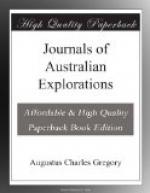Latitude by Vega 18 degrees 7 minutes 45 seconds.
6th September.
Starting at 6.25 a.m. our route was average east over a level country of very bad quality; the soil ironstone gravel, producing terminalia, triodia, and silk cotton-trees (Cochospermum gregoranum). Towards the latter part of the stage the country improved, becoming more open and grassy. At 12.15 camped on a large creek with a shallow pool of muddy water.
Latitude by Vega 18 degrees 9 minutes 45 seconds.
7th September (Sunday).
Remained at the camp to rest the party. A strong south-east wind blew during the night, and the day was cool and clear; the air very dry. Repaired our saddle-bags, which, from frequent contact with rocks and dead trees, were much dilapidated.
8th September.
Steered east-south-east from 6.40 am to 11.40, crossing low ironstone ridges and wide grassy plains, with belts of box, terminalia, white-gum, and silver-leafed ironbark of small size; the grass very inferior, with patches of triodia on the ridges; then traversed a level country covered with small trees and dry grass for two hours, after which we followed a dry watercourse, with large hollows in its bed, to the north-north-west for one hour; the shells of large unios abundant, but no water; altered the course to the east; passed two lines of box-trees crossing the plain from the south to the north, and at 5.50 p.m. camped in the plain without water; a strong breeze from the south-east during the day had rendered the heat less oppressive than usual.
Latitude by Vega 18 degrees 12 minutes 40 seconds; variation of compass 5 degrees east.
The Flinders river.
9th September.
Left our waterless camp at 6.10 a.m., steering north 50 degrees east magnetic over a level grassy plain; at 9.40 reached a fine river of fresh water 100 yards wide, but very shallow; pelicans, ducks, and other water-fowl were numerous, but very shy and wild; here we camped, although the grass was very inferior on the immediate banks of the river, the surface of the soil being very much furrowed by the rain; small fragments of limestone and a few quartz pebbles have been observed on the surface of the plain for the past twenty miles, and a dark limestone rock is exposed in the bed of the river, where it has horizontal stratification; fragments of flinty slate and trap exist in the gravel of the bed of the river, which, from its position, must be the Flinders River of the charts.
Latitude by a Aquilae 18 degrees 8 minutes 41 seconds; variation of compass 4 degrees 20 minutes east.
10th September.




